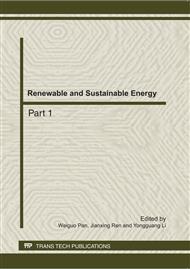p.3077
p.3083
p.3087
p.3093
p.3098
p.3103
p.3107
p.3116
p.3120
An Empirical Analysis of Relative Oil Price Shocks and Chinese Net Processing Exports
Abstract:
This paper studies the effects of Chinese relative domestic oil prices on net processing exports. Using a set of monthly data ranging from 2002 to 2008, we identify a long-run equilibrium cointegrating relationship between the two inflationary series. The unidirectional short-run Granger causality is running from relative oil prices to net processing exports, while in the long-run, the Granger causality is bidirectional. What is noteworthy is that relative oil price shocks have long-run positive effects on Chinese net processing exports, indicating the existence of an energy cost-driven mechanism of endogenous technological change.
Info:
Periodical:
Pages:
3098-3102
Citation:
Online since:
October 2011
Authors:
Price:
Сopyright:
© 2012 Trans Tech Publications Ltd. All Rights Reserved
Share:
Citation:


